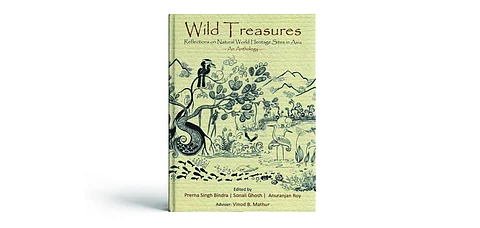
- Destinations
- Experiences
- Stay
- What's new
- Celebrating People
- Responsible Tourism
- CampaignsCampaigns
- SubscribeSubscribe
- Buy Now

To be listed by UNESCO as a Natural World Heritage Site, a place must have &ldquoa quality so exceptional as to transcend national boundaries and to be of common importance for present and future generations of all humanity.&rdquo Not only do the 18 sites included in Wild Treasures live up to their requirement of transcendence, much of the writing offered is sublime.
Painstakingly compiled by Prerna Singh Bindra, Sonali Ghosh and Anuranjan Roy under the guidance of Vinod B. Mathur, director of the Wildlife Institute of India, the anthology&rsquos gems comprise &ldquoessays and book extracts from past stalwarts such as M. Krishnan and Salim Ali to present-day savants like Amitav Ghosh and Stephen Alter.&rdquo
Describing the Keoladeo Ghana in 1953, Salim Ali writes, &ldquo...at the onset of monsoon, a water bird influx of such degree occurs that counting them is a task impossible.&rdquo India&rsquos beloved &lsquoBirdman&rsquo had the foresight to realise Ghana's importance as &ldquoan unparalleled birding haven,&rdquo and in his own voice, we hear lyrical descriptions of not just waterbirds but also of Keoladeo&rsquos journey from hunting preserve to a sanctuary. In another essay, eminent naturalist M. Krishnan recounts his tryst with a tusker in Kerala&rsquos Periyar where he risks life and limb for the perfect photograph.
Fittingly, the only work of fiction is an excerpt from Amitav Ghosh&rsquos The Hungry Tide, where we meet Piya, a young Bengali US-based cetologist and her research subjects&mdashendangered Irrawaddy dolphins&mdashin India&rsquos Sunderbans, &ldquothe ragged fringe of [India&rsquos] sari.&rdquo Meanwhile, on the Bangladesh side of the Sunderbans, we stumble upon author and conservationist Ruth Padel, whose great-great grandfather was none other than Charles Darwin. We accompany Ruth on her quest in search of &ldquothe Lord of Mud and Tide&rdquo&mdashthe swimming tigers of the Sunderbans&mdashand end up &ldquostanding on a tiger&rsquos dinner table.&rdquo
Sanctuary Asia editor Bittu Sahgal, who along with conservationist Ranjit Barthakur, narrates the story of Kaziranga&rsquos birth and salutes its unsung heroes. Ecologist Koustubh Sharma travels to the roof of the world&mdashWestern Tien Shan&mdashto develop a trans-boundary conservation plan between Kyrgyzstan, Uzbekistan and Kazakhstan. And finally, Her Majesty the Royal Queen Mother of Bhutan, Ashi Dori Wangmo Wangchuck, shares moments from her childhood that were spent exploring the Royal Manas National Park on elephant-back.
In his foreword, Ruskin Bond implores lovers of the wild to &ldquolose no time in dipping into this treasure trove of nature writing.&rdquo Indeed, the book&rsquos girth should not daunt you for one can dip in and out of its individual stories at leisure. You&rsquoll meet a racket-tailed drongo in Periyar, who mimics the field director&rsquos alarm clock at the oddest hours you&rsquoll watch with bated breath as a pack of wild dogs (dhole) chase a leopard up a tree in Nagarhole and you&rsquoll sit spellbound while a snow leopard pads noiselessly along a ridgeline in the shadow of Mount Everest.
In his opening essay, &lsquoWriting Outdoors&rsquo, Stephen Alter says we must think of natural heritage sites &ldquonot just as a final refuge for wildlife but as living, breathing epics that contain a multitude of characters, conflicts and conclusions that need to be remembered and retold&rdquo. He talks about the importance of good nature writing, and his advice is simple &ldquofirst of all, go on...get outdoors...&rdquo
The book is a publication of Aryan Books International and costs Rs 995.
